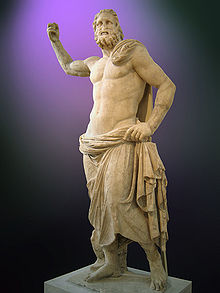The next greek god is Poseidon. Poseidon was one of the Twelve Olympians in ancient Greek religion and myth, god of the sea, storms, earthquakes and horses. In pre-Olympian Bronze Age Greece, he was venerated as a chief deity at Pylos and Thebes. His Roman equivalent is Neptune.
 |
| Statue of Poseidon |
Poseidon is widely known as protector of seafarers, and sea creatures. His name is Greek for “husband.” He wielded the trident or three-pronged spear, and this image of him is reflected in art. He could strike the ground with his trident to produce an earthquake. This earned him the nickname “Earth-shaker.” Poseidon possessed a palace, made of gems and coral, located on the ocean floor.
He was at Mount Olympus more often than his palace. Poseidon was god of the sea, earthquakes, storms, and horses and is considered one of the most bad-tempered, moody and greedy Olympian gods. He was known to be vengeful when insulted.In the heavily sea-dependent Mycenaean culture, there is not sufficient evidence that Poseidon was connected with the sea. We do not know if "Posedeia" was a sea-goddess.
Homer and Hesiod suggest that Poseidon became lord of the sea following the defeat of his father Cronus, when the world was divided by lot among his three sons; Zeus was given the sky, Hades the underworld, and Poseidon the sea, with the Earth and Mount Olympus belonging to all three. Poseidon was most notably the God of the sea and the protector of all waters; sailors relied upon him for safe passage.
He was allotted his dominion after the fall of the Titans. It stands to reason that, because of his influence on the waters, he was worshipped in connection with navigation. He was also worshipped as a fertility god. Poseidon was moody by nature: his temperament was unstable at best, and his emotional fluctuations often resulted in violence
In Homer's Iliad, Poseidon supports the Greeks against the Trojans during the Trojan War and in the Odyssey, during the sea-voyage from Troy back home to Ithaca, the Greek hero Odysseus provokes Poseidon's fury by blinding his son, the Cyclops Polyphemus, resulting in Poseidon punishing him with storms, the complete loss of his ship and companions, and a ten-year delay.
Given Poseidon's connection with horses as well as the sea, and the landlocked situation of the likely Indo-European homeland, Nobuo Komita has proposed that Poseidon was originally an aristocratic Indo-European horse-god who was then assimilated to Near Eastern aquatic deities when the basis of the Greek livelihood shifted from the land to the sea, or a god of fresh waters who was assigned a secondary role as god of the sea, where he overwhelmed the original Aegean sea deities such as Proteus and Nereus
Poseidon is also the subject of a Homeric hymn. In Plato's Timaeus and Critias, the island of Atlantis was Poseidon's domain. Conversely, Walter Burkert suggests that the Hellene cult worship of Poseidon as a horse god may be connected to the introduction of the horse and war-chariot from Anatolia to Greece around 1600 BC.
No comments:
Post a Comment